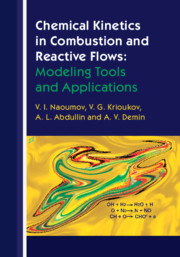Description
Chemical Kinetics in Combustion and Reactive Flows
Modeling Tools and Applications
Authors: Naoumov V. I., Krioukov V. G., Abdullin A. L., Demin A. V.
Featuring novel mathematical tools for the modeling, simulation and analysis of chemical non-equilibrium phenomena in combustion and flows.
Language: English
Subject for Chemical Kinetics in Combustion and Reactive Flows:
151.75 €
In Print (Delivery period: 14 days).
Add to cart
Publication date: 08-2019
442 p. · 17.8x25.3 cm · Hardback
442 p. · 17.8x25.3 cm · Hardback
Description
/li>Contents
/li>Biography
/li>
Following elucidation of the basics of thermodynamics and detailed explanation of chemical kinetics of reactive mixtures, readers are introduced to unique and effective mathematical tools for the modeling, simulation and analysis of chemical non-equilibrium phenomena in combustion and flows. The reactor approach is presented considering thermochemical reactors as the focal points. Novel equations of chemical kinetics compiling chemical thermodynamic and transport processes make reactor models universal and easily applicable to the simulation of combustion and flow in a variety of propulsion and energy generation units. Readers will find balanced coverage of both fundamental material on chemical kinetics and thermodynamics, and detailed description of mathematical models and algorithms, along with examples of their application. Researchers, practitioners, lecturers, and graduate students will all find this work valuable.
Part I. Basic Components of Chemical Non-Equilibrium Models: 1. Approaches to combustion simulation: patterns, models and main equations; 2. Governing equations of chemical kinetics and specific features of their solution; 3. Software tools for the support of calculation of combustion and reacting flows; Part II. Mathematical Modeling of Selected Typical Modes of Combustion: 4. Laminar premixed flames: simulation of combustion in the flame front; 5. Droplets and particles: evaporation in high-temperature flow and combustion in boundary layers; 6. Models of droplet evaporation in reacting flow; Part III. Simulation of Combustion and Non-Equilibrium Flows in Propulsion and Power Generation Systems: 7. Simulation of high-temperature heterogeneous reacting flows; 8. Simulation of two-phase flows in gas generators of liquid propellant rocket engines; 9. Pressurization of liquid-propellant rocket engine tanks; 10. Combustion and ionization in spark ignition engines; References; Index.
V. I. Naoumov is a Professor of Mechanical and Aerospace Engineering at the Central Connecticut State University. His areas of the scientific interest are: chemical kinetics, aerothermochemistry, and combustion in aerospace propulsion systems and automotive engines. He has thirty-five years of experience with teaching and performing research for leading aerospace companies. Dr Naoumov is a Distinguished Scientist of the Russian Republic of Tatarstan; Recipient of the Outstanding Research Award of the USSR State Committee for Public Education and Central Committee of Trade Unions for Education and Science; and Recipient of the ASME 2018 Distinguished Engineer of the Year Award.
V. G. Krioukov is a Professor of Mechanical and Aerospace Engineering at the Kazan National Research Technical University, Russia. He is a scientist in the field of thermodynamics, chemical kinetics, combustion and flows in propulsion and power generation systems. He has forty years of experience with teaching and performing research for leading Russian aerospace companies. He established the first 'Mathematical Modeling' Graduate Program in Brazil. Dr Krioukov is a Distinguished Scientist of the Russian Republic of Tatarstan and Recipient of the Outstanding Research Award of the USSR State Committee for Public Education and Central Committee of Trade Unions for Education and Science.
A. L. Abdullin is a Vice President and Academician of the Academy of Sciences of the Russian Republic of Tatarstan; Professor and Chair of the Department of Automotive Engines at the Kazan National Research Technical University, Russia. His areas of expertise are: chemical kinetics, combustion and reactive fluid systems. Dr Abdullin is Distinguished Scientist of the Russian Republic of Tatarstan; Recipient of the Gold Medal of the Society of Inventors of the Republic of Tatarstan, and Recipient of the Honorary Diploma from the Ministry of Education and Science of Russian Federation.
A. V. Demin is a Pro
V. G. Krioukov is a Professor of Mechanical and Aerospace Engineering at the Kazan National Research Technical University, Russia. He is a scientist in the field of thermodynamics, chemical kinetics, combustion and flows in propulsion and power generation systems. He has forty years of experience with teaching and performing research for leading Russian aerospace companies. He established the first 'Mathematical Modeling' Graduate Program in Brazil. Dr Krioukov is a Distinguished Scientist of the Russian Republic of Tatarstan and Recipient of the Outstanding Research Award of the USSR State Committee for Public Education and Central Committee of Trade Unions for Education and Science.
A. L. Abdullin is a Vice President and Academician of the Academy of Sciences of the Russian Republic of Tatarstan; Professor and Chair of the Department of Automotive Engines at the Kazan National Research Technical University, Russia. His areas of expertise are: chemical kinetics, combustion and reactive fluid systems. Dr Abdullin is Distinguished Scientist of the Russian Republic of Tatarstan; Recipient of the Gold Medal of the Society of Inventors of the Republic of Tatarstan, and Recipient of the Honorary Diploma from the Ministry of Education and Science of Russian Federation.
A. V. Demin is a Pro
© 2024 LAVOISIER S.A.S.




